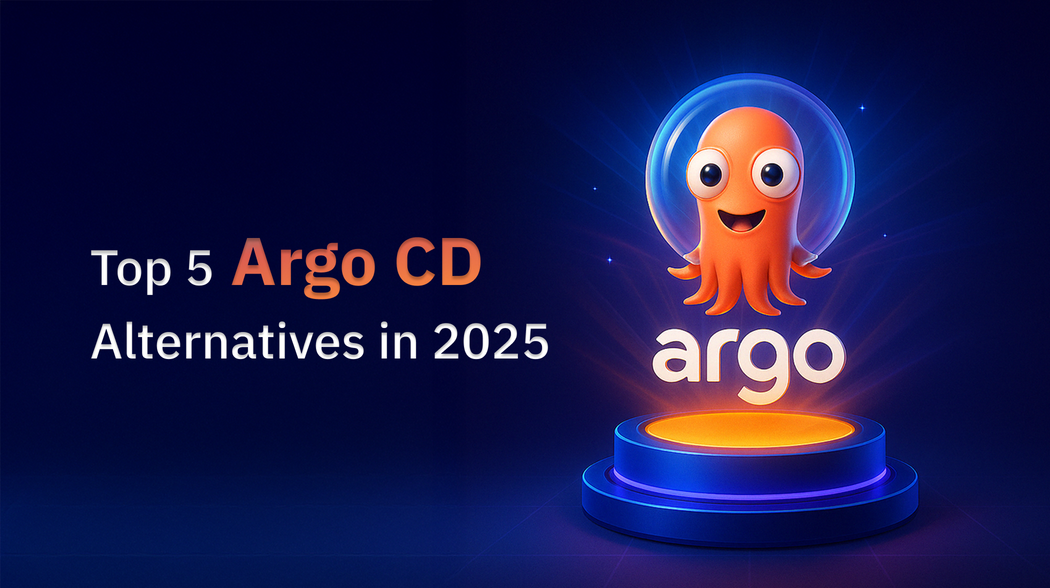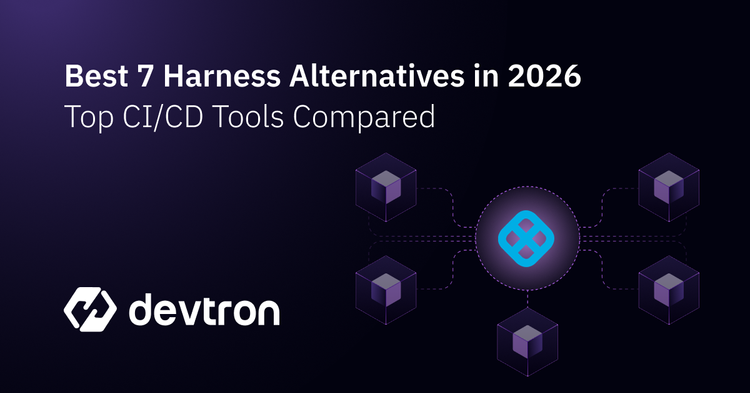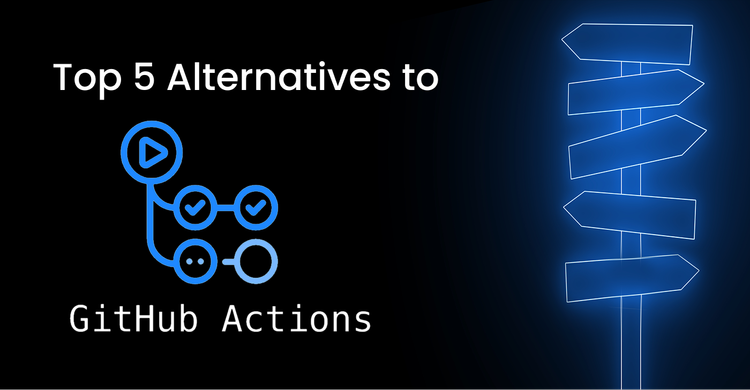Argo CD is a declarative, GitOps continuous delivery tool designed specifically for Kubernetes. Argo CD treats your Git repositories as the single source of truth and ensures that the desired application state defined in Git is consistently synchronized with the actual state in Kubernetes clusters. Upon detecting any discrepancies between these states, Argo CD can automatically or manually synchronize the configurations to align the cluster's current state with the desired state. This approach streamlines application deployments and enhances visibility and control over application lifecycles.
Why Look for an ArgoCD Alternative?
Argo CD is an exceptional tool for Git synchronization, but it lacks certain capabilities that are required for robust Continuous Deployment. The challenges of Argo CD and the capabilities that Argo CD natively lacks are:
- Fragmented Progressive Delivery: While ArgoCD provides the capability to sync Git repositories to Kubernetes clusters, it requires support from the ecosystem tools to manage advanced deployment strategies. You can’t rely on ArgoCD, you need to manage some external tools like Flagger to handle your advanced deployments.
- Limited Security and Compliance: When it comes to managing security and compliance, ArgoCD does not have any capability to scan images for vulnerabilities before deployments. You need to handle the security scanning and compliance activities outside of ArgoCD, like at the CI stage.
- No Native SLO-Based Rollbacks: ArgoCD lacks native support for these SLO-based Rollbacks and Auto-remediations. To have these, you need to maintain manually written scripts or need to manage external tools from the ecosystem.
- Operational Challenges: Teams need to manage multiple tools simultaneously along with their Kubernetes cluster and ArgoCD instance, which slows down the operational speed of teams and creates unnecessary complications.
Key Evaluation Criteria for GitOps Tools
When evaluating other GitOps tools as alternatives to Argo CD, it's essential to assess them based on several critical criteria to ensure they align with your needs. Some of the criteria to check can be:
- Kubernetes-Native Architecture: The alternative tool should be designed to integrate seamlessly with Kubernetes, leveraging its native features for efficient deployment and management of your cloud native applications.
- Multi-Cluster Deployment Support: Ensure the tool can manage deployments across multiple clusters, facilitating smooth scalability without increasing overhead work.
- Role-Based Access Control (RBAC): The tool should facilitate robust RBAC capabilities to define and enforce user permissions effectively, enhancing security and compliance.
- GitOps Automation and Drift Detection: The tool should automatically synchronize the desired state from Git repositories to the cluster and detect configuration drifts, ensuring consistency and reliability.
- Extensibility and CI/CD Integrations: Consider tools that offer flexibility to integrate with existing CI/CD pipelines and other DevOps tools, allowing for a cohesive workflow.
- User Interface and Usability: A user-friendly interface can significantly enhance productivity by simplifying complex deployment processes and providing clear visibility into application states.
Top 5 Argo CD Alternatives in 2025
Devtron
Devtron is an application lifecycle management platform that provides Kubernetes-native CI/CD capabilities alongside comprehensive application visibility and management in a single unified interface. By building upon Argo CD's core Git synchronization strengths, Devtron extends functionality to address critical enterprise needs.
Some key features of Devtron are
- Multi-cluster Deployments: Deploy and manage applications seamlessly across multiple Kubernetes clusters from a single interface, enabling consistent governance across hybrid and multi-cloud environments.
- Security and Compliance: Integrate vulnerability scanning tools for both code and container images with configurable gates that prevent vulnerable applications from reaching production.
- Policy-Based Deployments: Configure comprehensive security and compliance policies that automatically enforce organizational standards throughout the application deployment lifecycle.
- Release Orchestration: Devtron enables you to manage complex deployments through a single pane of glass with dependency management, deployment gates, and policy-based deployments, ensuring proper sequencing and coordination of multi-service releases.
- Flexible CI/CD: Seamlessly connect with external CI systems like Jenkins and GitHub Actions, allowing teams to leverage existing tools while benefiting from Devtron's deployment capabilities. The pre and post-build/deploy stages give you the flexibility to execute custom tasks before and after each phase of your pipeline.
- Native Support for Advanced Deployments: Reduce deployment risk with native support for advanced deployment strategies like blue-green and canary, enabling gradual rollouts with automated health verification.
FluxCD
FluxCD is a continuous delivery tool that automates the deployment of applications to Kubernetes by using Git repositories as the source of truth. It enables GitOps workflows by automatically reconciling the state of your cluster with the desired state defined in Git.
Key features of FluxCD:
- GitOps automation: Continuously synchronizes your Kubernetes cluster with Git repositories, automatically deploying new versions when changes are pushed.
- Multi-tenancy support: Provides strong RBAC integration and namespace isolation for managing multiple teams and applications on shared clusters.
- Helm integration: Native support for Helm charts with customizable release automation and value overrides for different environments.
- Progressive delivery: Works with Flagger for advanced deployment strategies like canary releases, blue/green deployments, and A/B testing based on metrics.
- Extensible architecture: Built on a modular controller design with a standardized API that allows for customization and extension to fit specific workflows.
Jenkins X
Jenkins X is an open-source tool to automate and accelerate continuous integration and continuous delivery for cloud-native applications. It simplifies the process of deploying software to Kubernetes, allowing developers to focus more on building applications rather than managing infrastructure.
Key features of Jenkins X:
- Cloud-native infrastructure: Leverages Kubernetes to host core services and integrates cloud storage, container registries, and secret management solutions like Vault and cloud-based providers.
- GitOps for cluster management: Uses Git to manage cluster configurations, Helmfile for package management, and automatic polling for updates to ensure all changes are auditable and version-controlled.
- Integrated pipelines: Ships with Tekton to provide clean, declarative pipelines and supports Lighthouse for automating pipeline interactions via Git comments (ChatOps).
- Secret management: Works with External Secrets and cloud-hosted secret managers to securely handle sensitive data, avoiding direct storage in Git.
- Flexible orchestration: Supports Tekton for cloud-native pipelines and traditional Jenkins for users with legacy workloads.
Spinnaker
Spinnaker is an open-source, multi-cloud continuous delivery platform originally developed by Netflix to enable fast, safe, and repeatable deployments across cloud providers. It provides robust pipeline management with built-in deployment strategies for complex application delivery.
Key features of Spinnaker:
- Multi-cloud deployment: Native support for AWS, GCP, Azure, Kubernetes, and other cloud providers with consistent deployment flows, regardless of target infrastructure.
- Sophisticated deployment strategies: Advanced deployment patterns, including blue/green, canary, and rolling updates with automated rollback capabilities.
- Pipeline management: Visual pipeline editor with templates, triggers, and conditions for complex orchestration across environments.
- Fine-grained authorization: Role-based access control with detailed permissions for applications, accounts, and deployment actions.
- Immutable infrastructure: Designed around immutable patterns, ensuring consistent and reliable deployments with clear history and rollback paths.
Fleet (by Rancher)
Fleet is a GitOps-oriented continuous delivery tool designed by Rancher to manage Kubernetes clusters and applications at scale. It's particularly focused on managing deployments across many clusters from a single control point.
Key features of Fleet:
- Multi-cluster management: Deploy applications to thousands of clusters with a single configuration, with support for cluster grouping and targeting.
- Differential deployment: It intelligently determines what needs to change on each cluster, minimizing disruption and resource usage during updates.
- Helm and manifest support: Works with raw Kubernetes manifests, Kustomize, and Helm charts with override values for different environments.
- Policy enforcement: Apply consistent configuration and security policies across all managed clusters with centralized verification.
- Edge and disconnected operations: Designed to work with intermittently connected clusters, making it suitable for edge computing scenarios.
Devtron vs ArgoCD: A Quick Comparison
| Feature | Devtron | ArgoCD |
|---|---|---|
| GitOps Support | Leverages Argo CD as the core GitOps engine and extends it with additional enterprise capabilities | Purpose-built GitOps tool with a focus on reconciliation. |
| UI/UX | Advanced and single unified dashboard for managing deployments. | Minimal UI to visualize the current state of deployments. |
| Multi-cluster Support | Native support with centralized management console. | Supports multi-cluster deployments but gets complex at scale. |
| CI Integration | Built-in CI pipelines plus external integrations with CI tools like Jenkins, GitHub Actions, etc. | Deployment-focused, requires external CI tools |
| Deployment Strategies | Native support for canary, blue-green deployment strategies. | Basic deployment patterns need additional tools for advanced strategies |
| Security Features | Built-in vulnerability scanning, policy enforcement | Limited to manifest verification |
Conclusion
While ArgoCD remains a powerful player in the GitOps ecosystem, modern enterprises require more comprehensive solutions that extend beyond basic Git synchronization. The top alternatives—Devtron, FluxCD, Jenkins X, Spinnaker, and Fleet—each offer unique capabilities to address ArgoCD's limitations in areas like progressive delivery, security integration, and multi-cluster management. Devtron stands out by building upon ArgoCD's core strengths while adding enterprise-grade features for security scanning, advanced deployment strategies, and unified management.
Devtron vs. the Rest: See How We Compare
Making a switch? Discover how Devtron measures up to today’s top DevOps tools.
1. Top 7 Octopus Deploy Alternatives
2. Top 5 Alternatives to GitHub Actions
3. Top 5 Alternatives to GitLab
4. Top 5 Alternatives to Jenkins
5. Top 7 CircleCI Alternatives
6. Top 5 Alternatives to Rancher
7. Top 5 Alternatives to Kubernetes Dashboard
FAQ
What are the main limitations of Argo CD that make alternatives worth considering?
Fragmented progressive delivery requiring external tools, limited security scanning capabilities, lack of native SLO-based rollbacks, and operational complexity when managing multiple tools alongside Argo CD.
Which Argo CD alternative offers the best security features?
Devtron provides the most comprehensive security features with built-in vulnerability scanning for code and container images, configurable security gates, and policy-based deployments that enforce compliance standards.
How does Devtron differ from Argo CD?
Devtron extends Argo CD's core capabilities with built-in CI pipelines, native support for advanced deployment strategies, security scanning, and a unified dashboard for managing multi-cluster deployments.
Is Devtron open-source?
Yes, Devtron is open-source with enterprise-grade capabilities available via paid tiers.






